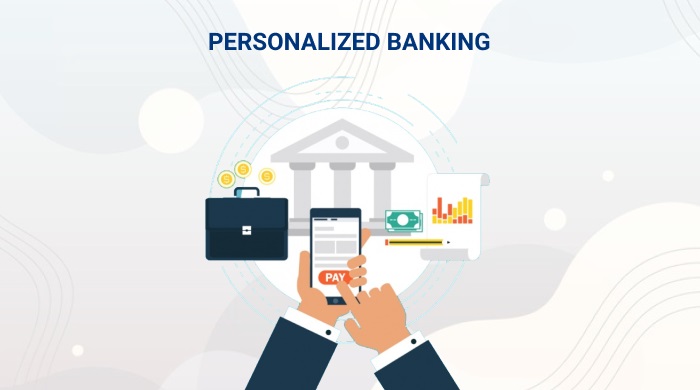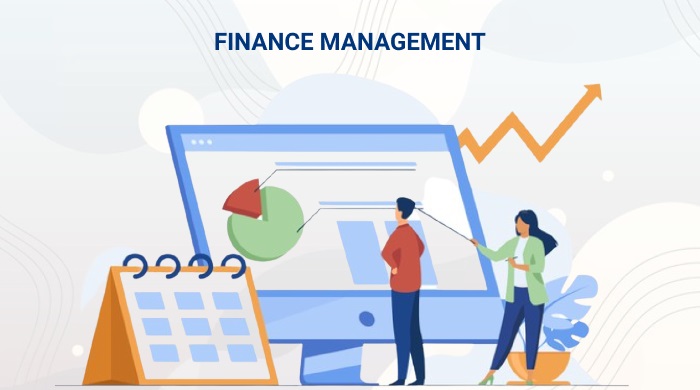Today, the future of all businesses is impacted by Artificial Intelligence. AI continues to be a significant technical leader in the year 2021. There is a lot of excitement these days about AI and its future business applications. In order to enhance productivity or client experience, several organizations are carefully evaluating the adoption of AI. Most businesses have succeeded in doing that. But many are still in the process.
Artificial Intelligence is an incentive of creativity, efficiency and development for better business growth and society. Companies should take advantage of this new technology. AI is capable of ensuring privacy, transparency, accountability and social benefits.
AI has not just evolved in the IT sector but has been beneficial for the Finance sector along with other sectors. When we say finance industry, it is used widely from insurance and money management to payments and digital banking technology. In contrast with other sectors, the financial sector showed itself to be an early adopter of AI. There are, therefore, countless applications of Artificial Intelligence and Machine Learning in the finance industry.
Artificial Intelligence in Finance has been setting a new set of transformation in the way we transact money and in the way finances are handled. This article will familiarize you with Finance AI and we will see some emerging examples of AI in the Financial Industry.
What is Finance AI?
Artificial Intelligence has evolved the manner in which we deal with finances. AI allows the financial sector to streamline and optimize processes from lending decisions to quantity trading and even the management of financial risk. It has the capacity to allow corporates to predict and assess potential risks. The world of banking and finance as a whole has been seeing a huge transformation with Artificial Intelligence.
According to a research conducted “About 32% of financial serviceproviders now use AI technologies as Predictive Analytic, Voice Recognition and more."
Finance AI provides bankers and insurance administrators with new ways to conduct business. Financial analysts are no longer limited to human opinion for the purpose of making financial predictions or recommendations. Analysts can now ask machines about issues related to their business with AI in finance, and in turn, these machines can evaluate data and help them make better data-driven decisions. Nearly 80% of the finance sector is highly aware of the potential benefits of implementing AI.
Look at the various advantages of AI in finance world:
- Boosts effectiveness and efficiency through automation
- Reduces human bias and errors of psychological or emotional causes
- Enhances management information's consistency and existence through detecting anomalies or longer-term patterns
- Allows superior customer service
- Optimizes basic daily functions of banking customers, such as facilitating boarding, handling transactions etc.
- Digitized receivable & payable account
Financial service companies are incorporating AI and Machine Learning technologies to create new digitally-driven data sources. No other business sector is concentrating more as compared to the financial sector on the production and implementation of AI in terms of speed, precision and performance. Machine learning algorithms is a trend from which the financial sector can immensely benefit from. AI creates a massive influence on finance.
Let us discuss how effectively AI is being implemented by the Financial Industry
AI is changing the financial services industries at large. Innovations give way to new sources of revenue. To change organizational functions, the long-term implications of AI adoption are becoming ever more important. The next generation of applications and services for the financial service sector is lead by Artificial Intelligence.
#1 Risk Management

In this digitized world, security threats and data-related risks have become a top priority. Organizations are keen to provide techniques that can minimize these risks. As a result, an improved risk management strategy is required to identify and handle risks for digital properties. This includes proprietary corporate data and intellectual data. Risk management is a process where risks to incomes and resources of an enterprise are identified, assessed and managed. These threats/risks may be derived from a broad range of sources, including financial instability, legal liability, policy mistakes, incidents, natural disasters etc.
Artificial Intelligence plays a key role in managing risk. For risk scenarios, algorithms may be used to evaluate case history and recognize any possible issues. This means using machine education to create accurate models allow financial experts to track specific trends and notice potential risks.
Through analyzing a large number of data sources, the use of AI and ML for banks and financial institutions will dramatically reduce risk levels. In comparison to conventional methods, typically restricted to sensitive details like credit score, AI can analyze vast amount of personal data in order to mitigate the risks.
An example of this may be machine-learning systems that attract customers who apply for loans and allocate risk ratings to various data sources. To help businesses reconsider or change terms for each client, the AI/ML algorithm can easily predict clients who could be defaulting in their debts.
In the banking and financial service industries, AI can automate many aspects of risk management.
The technology is doing great work. It is helping organizations perceive future risks more effectively, in order to give their customers more accuracy. In the future, algorithms will rule and help organization easily handle complicated tasks.
#2 Credit Decisions

AI is used to make the decision-making process more efficient in many ways. One field is credit, where AI can easily and at a lower cost reliably evaluate prospective borrowers. Credit scoring can be much more complicated than conventional credit scoring systems. They can help classify applicants with a greater likelihood of default without a credible credit history. The benefits of AI-powered models are both impartial and unbiased, which can be a factor in human decision-making.
For example, there are leading organizations that allow companies to evaluate customers with low lending history, by using AI-powered underwriting solutions. This will include straightforward ways to recognize groups that otherwise would be considered as high risk. They offer clarity by allowing lenders to determine credit-free borrowers. Their model tests hundreds of applicant data points up to ten times more than those that are traditionally used by the client's credit model.
AI is used to make the credit process more agile and effective in a variety of ways. The scope of smart data analysis in the credit sector ranges from the legitimization of a new customer applying for loans, the selection of a suitable credit product and optimization of credit checks.
Artificial Intelligence-driven systems can be improved easily, effectively and confidentially. These technologies are more commonly used by financial companies and more applications in the field of finance. AI has tremendous potential for the finance world and business executives, giving them the right data to make the most informed decisions.
#3 Personalized Banking

In this digital era, we see personalization in every sector. Customers are keener and more attracted to businesses and brands that offer customized services. 80% of consumers choose to have a product or service from a brand that offers a personalized experience.
In the finance sector, the personalized experience has taken a big turn with the adoption of AI Chatbot. These smart Chatbots powered by AI provides customers with comprehensive solutions and at the same time also reduces call center workload for the organization. Digital assistants with voice control are becoming increasingly popular. They can check balance sheets, operation and payment schedules on a regular basis.
Many banks have apps that provide personalized financial advice and help their customers smoothly achieve their financial objectives. These AI-enabled systems control revenue, ongoing expenditure and subsequently provide financial planning and suggestions. Mobile banking applications can also provide a reminder to pay bills, simplify purchases and more easily communicate with the bank.
In the financial service industry, personalization is likely to increase revenue by up to 15%.
To quote an example: A leading financial organization has implemented a conversational AI network to boost their customer experience. This Chatbot powered by AI offers self-service solutions, forecasts financial needs and provides measured suggestions to its customers. It helped them reduce call center volume and customer service costs by eliminating and qualifying customer inquiries. The ROI was that, without the presence of a live agent, this Bot managed 82% of consumer requests and inquiries single handed.
Financial AI increases performance, provides information and manages risk. The Chatbot allows banks to more effectively represent the clients, despite not being sufficiently sophisticated to manage support cases individually. Strengthened by a natural language process, Bots can respond to calls from agents, provide fast and reliable solutions and also provide best practices to increase the quality of sales.
#4 Fraud prevention

With massive growth in the digital business more and more customers can now be seen on different digital platforms. AI thoroughly authenticates the audience and reduces the risks and fraud activities. The financial sector contains very valuable data. Therefore, it is important for them to be more secure and implement more reliable sources to their application.
In recent years, there is massive growth in digital customer transactions and reliable fraud detection models are needed to safeguard sensitive data. AI will enable human analysts to improve rule-based models. In exchange, this will increase performance and precision and reduce costs.
AI can be used to review expenditure history and conduct, in order to display anomalies, including a card that is used during a short period in multiple global locations. AI will also benefit from human corrections and take decisions based on what needs to be addressed. All cases of application in fraud management have different AI algorithm specifications, but they are slightly different for each case. Monitoring transactions require quicker response time, error and accuracy along with the availability and consistency of data training.
The initial problem statement was differentiating between safe and risky anomalous behavior. Traditional firewalls, IDS and IPS feature signature-based threats is also one of them.This issue was solved by a company that helps banks detect threats automatically in real-time. They react quickly to attackers in hidden locations in data center workloads, users and IoT devices. They automate manual, time-consuming threat hunting and response by integrating human experience with a vast array of data sciences, machine learning tools, and behavioral analysis. It has eventually helped them reduce the workload on security operations.
Implementing AI in the finance world has enhanced actual fraud detection by 50% and reduced their false positives by 60%. It is expected to hit 80% as the learning paradigm of machines continued.
In recent days, several companies are offering banks with fraud detection services, passwords, credit application fraud, card monitoring and scraping. The business uses ML modeling to distinguish between genuine customers and bots which is educated on billions of applications.
#5 Trading

Investment firms rely on computer science and data science to reliably forecast future business trends.
Quantitative, algorithmic, high-frequency or data-driven investment trading has recently spread across capital markets around the world. AI supports data mining in finance and builds trading rule algorithms. In quantitative trading, it is particularly useful. AI-operated devices are quicker and more effective than people analyze massive and complicated data, resulting in savings in money and time.
Artificial Intelligence offers the benefit of analyzing trends from past knowledge and determining whether they will be replicated in the future. If any anomalies occur in the presented information, for example, a financial crisis, AI may analyze the data and identify potential triggers in the future. In order to support its decisions, AI may also personalize investments for investors and bankers.
Hundreds of data sources can also be analyzed at the same time by AI/ML algorithms, offering traders a clear advantage over the average market. Few of it’s benefits are:
- Increased precision and decreased probability of error
- AT enables the business to be carried out at the best rates possible
- Reduced Human errors
- Automatic and simultaneous monitoring of different market conditions
Financial companies that processes large quantities of unstructured data quickly, can produce signals and recognize real-time trends in the financial market through AI/ML. The solution analyses data or volume trading data and then condenses the information into an inventory number. The use of deep learning approaches enable customers to receive all the necessary data.
The ability to predict the future, as a field, depends on trade and investment. This is great because machines can smash a lot of data in a short period. Machines can be programed to keep track of the trends and to replicate patterns in the future.
AI has radically shaped the future of trading, making businesses more and more profitable and efficient. For example, robotics consultants are automated in the shortest time possible to evaluate millions of data points and to predict market prices. Moreover, it conducts business at the most productive time because it is able to conduct a variety of transactions in the stock market every second, in real time. AI therefore has an important role to play in accurate research, estimation, execution, and risk reduction.
#6 Finance Management

Finance management is a challenging task for many. While many mobile app developers are dependent on the financial industry, the management of personal finance and constructive money management has remained unchanged.
Today, however, AI is implemented to help people manage their finance, and therefore new innovation in the AI-based wallet is PFM i.e. Personal Financial Management. The industry is now using technologies such as Artificial Intelligence software to help handle personal finances more effectively.
AI commits to become the platform of the future finance industry that will enhance both, small-scale investmentsand large-scale investments.
AI gives customers a personal financial experience which is accurate and effective. It helps them to automatically select an acceptable way to spend, save and invest on the basis of their habits and objectives. With financial AI, smart products can be developed that can learn from the financial details of the customer, decide what works for them, and help them monitor their financial actions. This can also be used to get a better understanding of customer needs and help in catering to them accordingly.
Conclusion
For the financial sector, AI is definitely the future. As its revolutionary development is continuing, it will very soon offer quicker and more reliable solutions to make the financial processes simpler for customers. Bots evolve increasingly as developments in the AI field are being created. The companies that see this as a long-term cost-cutting investment plan need to make investments in the beginning. Refer to the list of Top Artificial Intelligence Software with the features, pricing, and reviews of the most popular AI software, and select the best Finance AI tool that fulfills your requirements and fits your budget.
AI has streamlined financial procedures and reduced customer service costs dramatically. While on one hand, AI has reduced the cost of financial services, on the other hand, funding has become extremely realistic. AI is effective in attracting a large part of the population to financial services through many digital platforms, which historically considered them to be lengthy, costly, and time-consuming in the initial stages.
It is widely mistaken that AI will destroy jobs in all sectors. This is a myth. AI can make financial professionals' tasks simpler and faster. It is to believe that in the process some jobs can be lost, however, new opportunities will also be developed hand in hand.
AI offers the ability to expand on the existing financial products and services structure or rows. AI contributes inestimably to the financial sector. AI tools like IBM SPSS, TensorFlow, Azure Machine Learning, Infosys Nia are already creating a buzz in the finance industry. In the course of time, AI will not only revolutionize the financial sector but will also become a dominating factor itself.
Artificial Intelligence is a technical development, but eventually, it will become a natural requirement, and more and more people will adopt it.



